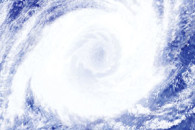Even though Hurricane Erika may have lost its steam before hitting southern Florida this past weekend, its the perfect time to think about how a hurricane might have affected the Florida Everglades, and more specifically the wildlife that can be found here. Usually following a hurricane, a large majority of the media coverage is centered around ways that human beings were affected by the storm – through loss of life or home – but not much attention is given to the local wildlife. Sadly, a hurricane can be detrimental to wildlife and nature, affecting everything from the fish in the waters, to the birds in the skies, to the plants that form the structure for it all.
Strong winds and water can dislocate individuals and even small populations. Dolphins and manatees have been washed or blown ashore during strong storms, but it is perhaps birds that take the biggest hit. Strong winds can separate flocks and isolate individuals, but can also blow large groups of birds completely off course, leaving them hundreds of miles from their homes.
Strong winds and water can destroy habitats. Both the unwelcome erosion caused by storm surges and the loss of trees, and even entire forests, from fast moving winds can have detrimental affects on the local wildlife. Not only do many species lose their homes and shelter during these times, but because high winds can also strip trees of their nuts and fruits, many lose important food sources as well.
Saltwater and freshwater areas can mix and be thrown off balance. Species are typically heavily adapted and accustomed to the delicate balance of salinity in their usual environments. During storm surges, large amounts of saltwater are pushed inland into freshwater rivers and lakes while heavy rains can overwhelm river basins and cause freshwater to flood the oceans, putting a great deal of pressure on species to survive in their drastically changed environments.
Rainfall and run-off can pollute oceans and streams. The mixing of freshwater and saltwater is not the only thing that can harm the oceans and its wildlife during and after a hurricane. Heavy rain and its run-off through populated areas back into oceans and streams can pollute marine environments and coastal areas that had previously been healthy and vibrant.
Strong weather can cause direct injury to wildlife. Fast winds and rough waves can cause direct harm to local wildlife, though marine life is arguably the worst to suffer. During the violent conditions produced by category 5 hurricane Andrew in 1992, it was estimated that more than 180 million fish were killed in the Everglades and close to another 10 million in the oceans offshore.
The next time a hurricane or tropical storm is making its way to Florida, take a moment to think about Florida’s native creatures and how resilient these species are to have survived through millions of years of stormy weather in Florida. And, you can always enjoy the local wildlife in good weather by taking an airboat tour through the Everglades with Captain Mitch and his crew. Everglades airboat rides are not just educational, but fun for the whole family too!

